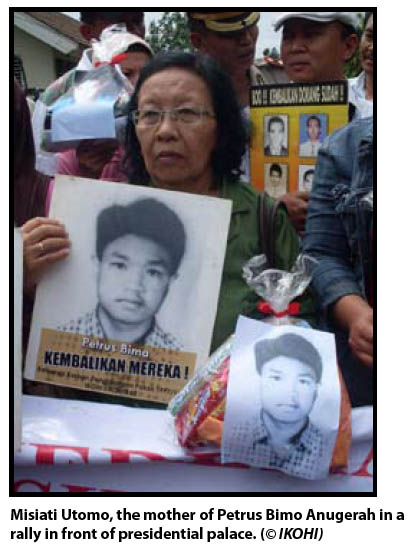The Ratification of the International Convention for the
Protection of All Persons from Enforced Disappearance by Indonesia:
The Long-Awaited Promise…
by Yasmin Purba
The ratification of the International Convention for the Protection of
all Persons from Enforced Disappearance (hereafter referred to as The
Convention) has been an overdue promise since 2007 given by the
Indonesian government to the families of the disappeared as well as to
the human rights organizations at home and abroad and to the general
public. The promised ratification was again reiterated by the House of
Representatives of the Republic of Indonesia (hereinafter referred to as
the House) in its recommendations to address the case of enforced
disappearances against 13 activists, who have been missing since
1997/1998. The House’s recommendations comprise the following:
1.
Recommending the president to establish an ad-hoc human rights court
to bring the perpetrators to justice;
2.
Recommending the president and other related institutions and parties
to immediately conduct search missions for the 13 missing activists of
1997-1998;
3.
Recommending the government to provide rehabilitation and compensation
for the families of the disappeared;
4.
Recommending the government to immediately ratify the Convention for
the Protection of all People from Enforced Disappearance as part of
the commitment and support to cease the practice of enforced
disappearances in Indonesia.
 Since
the above recommendations were legislated by the House in 2009, there
has not been a single point under the recommendations fulfilled by the
Yudhoyono administration. The only thing that is close to the
fulfillment of the fourth recommendation was the signing of the
Convention Against Enforced Disappearances on 27 September 2010. The
signing process should be regarded as a positive progress made by the
government towards ending the practice of enforced disappearance that
has been practiced widely in Indonesia for decades.
Since
the above recommendations were legislated by the House in 2009, there
has not been a single point under the recommendations fulfilled by the
Yudhoyono administration. The only thing that is close to the
fulfillment of the fourth recommendation was the signing of the
Convention Against Enforced Disappearances on 27 September 2010. The
signing process should be regarded as a positive progress made by the
government towards ending the practice of enforced disappearance that
has been practiced widely in Indonesia for decades.
However, Indonesia is still a half way through to complete the whole
ratification process and the treaty’s incorporation into its domestic
law. In this regard, the main challenge in the ratification process at
the parliament may come from two political parties, namely the Gerindra
Party and the Hanura Party. The first one is led by Prabowo Subiakto, a
former military general who is allegedly responsible for the abduction
and disappearance of 13 activists in 1997-1998 while the latter is led a
former Indonesian Chief of Armed Forces, who is also known as one of the
military superiors who is allegedly responsible for the atrocities in
East Timor subsequent to the independence referendum process in 1999.
 Both
parties currently have 44 representatives serving as members of the
parliament for the period of 2009-2014. The two parties would do
anything they could to hamper the Convention’s ratification process.
Considering this and the fact that the rest of the political parties at
the parliament have always had vague positions towards the Convention
and human rights enforcement as a whole, the advocacy conducted by IKOHI
and other human rights organizations to accelerate the ratification
process at the parliament will not be an easy task to complete. The
Indonesian government has a lot to prove with regards to human rights
enforcement and protection both at the domestic and international
levels. Enforced disappearance cases are among the many gross human
rights violations committed by the state that have to be resolved
through making the perpetrators accountable. In addition to the case of
the 13 missing activists in 1997/1998, the Indonesian government also
has to take responsibility towards the widespread practice of enforced
disappearance in, among others, the 1965-1966 atrocities during the
purge against Indonesian Communist Party, the 1984 and 1989 atrocities
during the purge of the alleged Muslim extremist groups in Jakarta and
Lampung and the practice of enforced disappearance committed by the
police and military in Papua against Papuan journalists, activists and
alleged members of the Free Papua Movement.
Both
parties currently have 44 representatives serving as members of the
parliament for the period of 2009-2014. The two parties would do
anything they could to hamper the Convention’s ratification process.
Considering this and the fact that the rest of the political parties at
the parliament have always had vague positions towards the Convention
and human rights enforcement as a whole, the advocacy conducted by IKOHI
and other human rights organizations to accelerate the ratification
process at the parliament will not be an easy task to complete. The
Indonesian government has a lot to prove with regards to human rights
enforcement and protection both at the domestic and international
levels. Enforced disappearance cases are among the many gross human
rights violations committed by the state that have to be resolved
through making the perpetrators accountable. In addition to the case of
the 13 missing activists in 1997/1998, the Indonesian government also
has to take responsibility towards the widespread practice of enforced
disappearance in, among others, the 1965-1966 atrocities during the
purge against Indonesian Communist Party, the 1984 and 1989 atrocities
during the purge of the alleged Muslim extremist groups in Jakarta and
Lampung and the practice of enforced disappearance committed by the
police and military in Papua against Papuan journalists, activists and
alleged members of the Free Papua Movement.
 The
widespread practice of enforced disappearances and the lack of judicial
means to criminalize enforced disappearance to hold the perpetrators
accountable should be perceived as an urgent call for the Indonesian
government to take action to stop the practice of enforced
disappearances and the ongoing impunity for the perpetrators of such
heinous crime. In this regard, the ratification of the Convention by the
Indonesian government can play a major step in making Indonesia free
from enforced disappearances.
The
widespread practice of enforced disappearances and the lack of judicial
means to criminalize enforced disappearance to hold the perpetrators
accountable should be perceived as an urgent call for the Indonesian
government to take action to stop the practice of enforced
disappearances and the ongoing impunity for the perpetrators of such
heinous crime. In this regard, the ratification of the Convention by the
Indonesian government can play a major step in making Indonesia free
from enforced disappearances.
After Iraq became the 20th country to ratify, the Convention will enter
into force on 23 December 2010. With this recent development, Indonesia
still has the opportunity to be the first ASEAN country to ratify the
Convention and might as well to take the lead in the region to promote
the ratification of the said Convention by other ASEAN members.

Yasmin Purba is currently working as a Program Manager at the Indonesian
Association of Families of the Disappeared. Her involvement in the human
rights movement has started since 2001, when she was working with the
Indonesian Legal Aid Foundation. She is a Fulbright scholar and holding
a degree on International Human Rights Law from the University of Notre
Dame Law School, Indiana, USA.